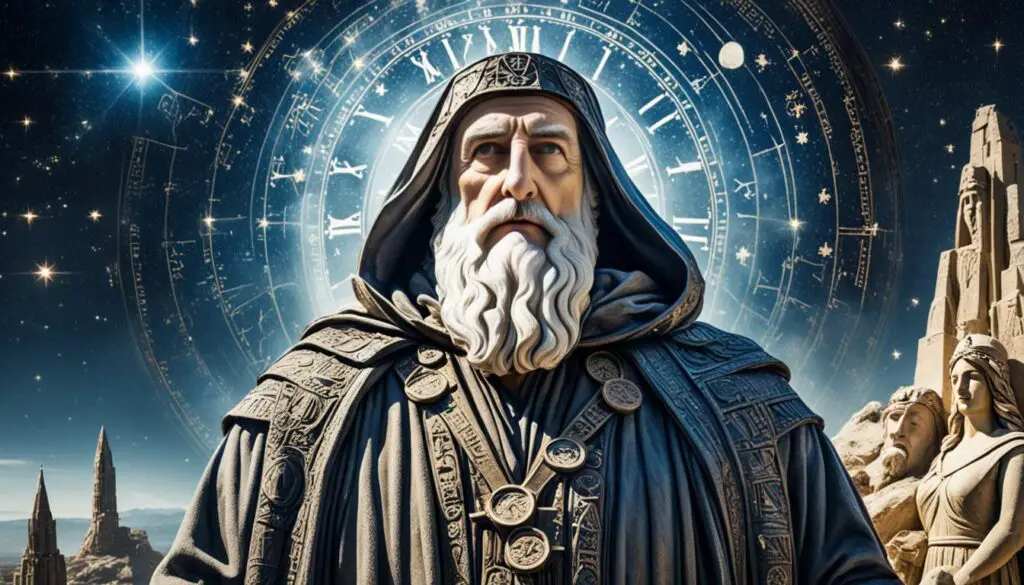Welcome to the fascinating world of Methuselah, a biblical figure shrouded in mystery and deep roots in ancient history. How long did Methuselah live? Join us on this captivating journey as we delve into the enigma of Methuselah’s age and explore his significant role in biblical genealogy.
Methuselah, known for his exceptional lifespan, is mentioned in the book of Genesis in the Bible. As we unravel the accounts of his age, we uncover not only the historical significance of Methuselah but also the broader context of ancient civilizations and their understanding of human longevity.
The tales of Methuselah provide a glimpse into a time long past, where ancient figures and their extraordinary lifespans captivated the imagination. Through the lens of ancient mythology and genealogical records, we aim to uncover the symbolic meaning and cultural impact of Methuselah’s long life.
Join us on this extraordinary journey as we separate fact from fiction, explore historical authenticity, and reveal the enduring legacy of Methuselah’s remarkable existence.
Key Takeaways:
- Methuselah’s lifespan has intrigued scholars and theologians for centuries.
- Exploring biblical genealogy provides insights into the historical context of Methuselah.
- Methuselah’s age is perceived as a symbolic representation in ancient mythology.
- Understanding factors influencing human longevity in ancient times enhances our understanding of Methuselah’s lifespan.
- Methuselah’s enduring legacy continues to impact cultural, literary, and religious beliefs.
Unraveling Methuselah’s Age in the Bible
When it comes to the enigmatic figure of Methuselah in biblical genealogy, one question stands out: how long did Methuselah live? In this section, we will explore the accounts in the Bible that mention Methuselah’s age and uncover the significance of his exceptional longevity.
According to biblical records, Methuselah is known for living the longest recorded human lifespan. The book of Genesis states that he lived for an astounding 969 years. His extensive lifespan has captivated scholars and historians, as it stands out among the biblical genealogies.
Methuselah’s age holds profound implications within biblical narratives as well. The book of Genesis portrays a world where human lifespans were much longer than what we see today. Methuselah’s remarkable longevity serves as a testament to the ancient understanding and portrayal of human lifespan in biblical times.
Intriguingly, Methuselah’s age does not exist in isolation. It is part of a larger biblical genealogy that traces the lineage from Adam to Noah. By examining Methuselah’s place within this genealogy, we gain a deeper understanding of his significance and the role he played in biblical history.
As we further explore the biblical accounts of Methuselah’s age and delve into the intricacies of biblical genealogy, we will unravel the secrets surrounding his exceptional lifespan. Let us embark on this journey to unveil the extraordinary tale of Methuselah within the pages of the Bible.
The Biblical Genealogy and Human Lifespan
Before we delve into Methuselah’s age, it is important to understand the context of human lifespan in biblical genealogies. The genealogies recorded in the Bible serve as a historical framework, tracing the lineage from Adam to various biblical figures, including Methuselah.
These genealogies not only establish familial connections but also signify the passing of time and the unfolding of historical events. Methuselah’s exceptional longevity within the genealogy highlights the long lives ascribed to the ancient patriarchs in biblical narratives.
As we navigate through the biblical texts and explore the genealogical records, we will gain valuable insights into the ancient perspective on human lifespan and the role Methuselah’s age played in shaping the biblical narrative. Stay with us as we unravel the mysteries surrounding Methuselah’s remarkable lifespan and its wider significance in biblical history.
Methuselah’s Longevity in Historical Context
When examining Methuselah’s remarkable lifespan, it is essential to place it within the historical context of ancient civilizations. Ancient history is replete with tales of individuals living extraordinary lengths of time, leaving us to wonder about the secrets of their longevity.
One of the notable aspects of Methuselah’s lifespan is its status as the longest recorded in history. This fact alone makes his story intriguing and prompts us to explore other documented cases of exceptional longevity.

Ancient texts and records from various civilizations provide glimpses into the lives of individuals who, like Methuselah, defied the normal limits of old age. From the Sumerian King Gilgamesh to the Chinese hermit Peng Zu, these extraordinary figures have captivated the imagination and curiosity of historians and scholars.
Studying these historical accounts allows us to gain insights into how ancient societies perceived and understood aging. For them, longevity was often associated with wisdom, divine favor, and exceptional virtues.
The Quest for Longevity
Throughout ancient history, the pursuit of longevity was a common theme. From ancient Egyptian pharaohs to Chinese emperors, rulers sought to extend their lives through various means, including magical rituals and elixirs of immortality.
The reasons behind this quest were manifold, ranging from personal ambitions to a desire for influence and power. Moreover, ancient civilizations often linked longevity to their religious beliefs, associating long life with divine favor or divine status.
By examining Methuselah’s lifespan in the context of these historical narratives, we can develop a deeper understanding of the cultural and societal significance attached to long life in ancient times.
Unlocking the Secrets of Ancient Longevity
Exploring ancient accounts of exceptional longevity opens up a world of possibilities and raises thought-provoking questions. Were these long lifespans embellishments of history or the result of different cultural perspectives on time and aging?
While we may never uncover all the secrets of ancient longevity, studying these historical records can shed light on the diverse ways in which ancient civilizations conceptualized and valued old age.
As we embark on our journey to uncover the mysteries of Methuselah’s long life, let us delve into the annals of ancient history to better comprehend the enigmatic nature of exceptional lifespans.
Exploring Methuselah’s Genealogy
As we delve deeper into the enigmatic figure of Methuselah, it is essential to explore his genealogy and trace his familial connections within the biblical narrative. Genealogy plays a crucial role in understanding ancient history, providing valuable insights into the lineage and heritage of significant individuals like Methuselah.
Within the framework of biblical genealogy, Methuselah holds a unique position. He is mentioned as the son of Enoch and the grandfather of Noah, linking him directly to key biblical figures central to the narrative of the Great Flood. By following the genealogical threads, we can unravel the intricate tapestry of Methuselah’s lineage and its significance within the broader context of biblical history.
Genealogical records not only shed light on familial connections but also provide a glimpse into the social, cultural, and historical aspects of ancient societies. They serve as a window into the lives and relationships of individuals who played pivotal roles in shaping ancient history.
The exploration of Methuselah’s genealogy not only deepens our understanding of his place in biblical history but also contributes to our comprehension of broader ancient history. By connecting Methuselah’s lineage to other biblical figures and historical events, we gain valuable insights into the intricate web of connections that form the tapestry of ancient civilizations.
Revealing Ancient Connections
Examining Methuselah’s genealogy reveals the intricate connections between biblical figures, highlighting their roles and contributions to ancient history. It unveils the interwoven threads that link individuals across generations, painting a vivid picture of the familial bonds and historical context that shaped their lives.
Through genealogical analysis, we gain a deeper appreciation for the complexity and depth of ancient history. It allows us to trace the lineage of Methuselah back to Adam and Eve, establishing his place within the broader narrative of human origins. This exploration not only enriches our understanding of biblical genealogy but also offers valuable insights into the broader tapestry of ancient history.
Biblical Accounts of Methuselah’s Life
Within the pages of the Bible, Methuselah emerges as a significant figure, deeply rooted in ancient history. The biblical texts provide us with stories and references that shed light on his life and contribute to his enigmatic portrayal.
One such account is found in the Book of Genesis, where Methuselah is described as the son of Enoch and the grandfather of Noah. According to these biblical narratives, Methuselah lived for an astonishing 969 years, making him the longest-lived individual mentioned in the Bible.
Throughout the Bible, Methuselah’s name is often associated with the concept of exceptional longevity, highlighting his prominence in ancient history. The recorded lifespan of Methuselah serves as a testament to the profound influence and significance attributed to biblical figures during that time.

The Symbolism of Methuselah’s Life
Beyond the numerical value of Methuselah’s age, his lifespan holds symbolic meaning in the biblical narrative and beyond. Some interpretations associate his longevity with divine favor, while others view it as a reminder of the impending judgment and the need for repentance.
Methuselah’s remarkable age also serves to establish a historical connection between the creation of the world and the great flood described in the Book of Genesis. His death is recorded to have occurred the same year the floodwaters engulfed the earth, reinforcing his role as a transitional figure in biblical history.
The biblical accounts of Methuselah’s life provide a glimpse into the ancient world, showcasing the significance of biblical figures and their impact on ancient history.
Methuselah’s Age and Historical Authenticity
As we delve deeper into Methuselah’s extraordinary lifespan, it is essential to consider the historical authenticity surrounding his age. The biblical narratives portray him as a prominent figure, but does the historical record support his remarkable longevity?
Historians and scholars have analyzed the evidence available to shed light on Methuselah’s age, examining it within the context of ancient history. Their perspectives provide valuable insights into the historical authenticity of this biblical figure.
One aspect that historians explore is the existence of other ancient records documenting exceptional lifespans. Comparing Methuselah’s age to other historical accounts allows us to contextualize the concept of longevity in ancient times. This broader analysis helps us understand where Methuselah’s age stands within the historical record.
Furthermore, historians consider the cultural and religious significance of Methuselah’s age in ancient societies. Understanding the beliefs and practices of those times allows us to interpret his age in the context of the ancient mindset.
Evaluating the Evidence
Through analysis and cross-referencing of ancient texts, historians meticulously examine the validity of Methuselah’s age. They scrutinize the biblical genealogies, ancient manuscripts, and historical references to determine the historical accuracy of his lifespan.
These investigations, however, come with certain challenges. The interpretation of ancient texts, the potential for symbolic meanings, and the lack of direct historical evidence pose obstacles to definitively verifying Methuselah’s age.
Nonetheless, the historical authenticity of Methuselah’s age continues to captivate scholars and researchers. Their ongoing exploration helps to unravel the mysteries of ancient history and shed light on the significance of biblical figures like Methuselah.
Methuselah’s Significance in Ancient Mythology
Ancient history is filled with intriguing tales and legendary figures, each with their own unique role and significance. One such figure is Methuselah, a biblical character renowned for his exceptional longevity. In this section, we delve into the realm of ancient mythology and explore the captivating role Methuselah plays within it.
Throughout ancient civilizations, Methuselah’s extraordinary lifespan became a symbol of wisdom, grandeur, and divine favor. His age, recorded as 969 years, intrigued and fascinated people for centuries, sparking countless interpretations and mythical tales.
Within ancient mythology, Methuselah’s exceptional longevity often made him a revered and mythical figure. His age symbolized an extraordinary connection to the gods or otherworldly realms, bestowing him with divine knowledge and power.
Some stories depict Methuselah as a guardian of ancient knowledge, possessing wisdom that surpasses mortal understanding. Others suggest that his life spanned such an extraordinary length to witness and guide humanity through significant historical events.
Ancient civilizations saw Methuselah as a bridge between humanity and the divine, an intermediary figure who encapsulated the essence of both mortal and immortal existence. His exceptional longevity served as a reminder of the mysteries of life, provoking awe and contemplation among the people of ancient times.
As we explore the ancient mythology surrounding Methuselah, we uncover the cultural and symbolic importance of his age. From legends passed down through generations to artistic representations and religious beliefs, Methuselah held a prominent place within the spiritual and mythological frameworks of various ancient societies. His exceptional longevity served as a source of inspiration, intrigue, and wonder.
The Symbolic Meaning of Methuselah’s Lifespan
Within the realms of biblical figure and ancient history, the age of Methuselah holds profound symbolic meaning and significance. His exceptionally long lifespan, as recorded in the scriptures, has sparked curiosity, interpretations, and religious contemplation throughout the ages.
img src=”https://seowriting.ai/32_6.png” alt=”biblical figure” />
Interpretations of Methuselah’s longevity vary across different cultural and religious traditions, each offering their unique perspective on its symbolic implications. Some view his age as a testament to divine favor or a reward for virtue, while others perceive it as a metaphorical representation of ancient wisdom and ancestral heritage.
In biblical and cultural contexts, Methuselah’s advanced age can be seen as a symbol of continuity, endurance, and the profound connection between past and present. It serves as a reminder of the rich tapestry of human history, bridging the gap between ancient civilizations and contemporary societies.
Throughout the centuries, religious scholars and theologians have contemplated the spiritual significance of Methuselah’s lifespan. Some interpret it as a lesson in patience, resilience, and faith, emphasizing the importance of perseverance and steadfastness in the face of adversity.
Moreover, Methuselah’s age has been associated with the concept of immortality and eternal life, reflecting the innate human longing for transcendence and the quest for a higher existence beyond the confines of temporal existence.
As we explore the symbolic meaning of Methuselah’s lifespan, it is important to recognize the multifaceted nature of interpretation and the diversity of perspectives that emerge from different cultural, religious, and philosophical frameworks. The richness of these interpretations allows for a deeper understanding of the historical and spiritual significance of Methuselah as a biblical figure and an enduring symbol of ancient history.
Factors Influencing Human Longevity in Ancient Times
Longevity has always been a topic of fascination throughout ancient history. The quest for the secrets to old age and extended human lifespan has captivated generations, from biblical figures like Methuselah to other mysterious individuals shrouded in myth and legend.
In exploring the factors that may have contributed to longer lifespans in ancient times, various theories have emerged. One such theory revolves around the importance of diet. Ancient civilizations relied heavily on natural, unprocessed foods, which were believed to promote health and vitality. Fresh fruits, vegetables, whole grains, and sources of lean protein were staples of their diets.
Another influential factor could be lifestyle. Ancient societies often engaged in physical labor and had active, agrarian lifestyles, which involved regular exercise and a close connection with nature. This physical activity likely contributed to their overall well-being and potentially extended their lifespans.
Genetics may have also played a role in exceptional longevity. Certain individuals may have carried genetic variations that enhanced their ability to combat diseases and maintain optimal health as they aged. These genetic advantages and adaptions could have contributed to longer lifespans in ancient times.
Environmental factors cannot be overlooked either. Ancient civilizations often inhabited regions with favorable climates, abundant natural resources, and access to clean air and water. These optimal living conditions may have contributed to their overall well-being and, subsequently, their extended lifespans.
While the theories surrounding the factors influencing longevity in ancient times may be speculative, they provide valuable insights into the mindset and lifestyle of our ancestors. By examining their practices and beliefs, we can gain a deeper understanding of the quest for long life and the importance of aging gracefully in ancient history.
Historical Figures and Exceptional Lifespans
In our exploration of exceptional lifespans in ancient history, we cannot overlook other historical figures who have captured our fascination. These individuals, like Methuselah, stand out for their remarkably long lives, defying the norms and expectations of human existence. By examining these extraordinary cases, we gain further insight into the possibilities and limitations of recorded lifespans within different historical contexts.
One such historical figure is Li Ching-Yuen, a Chinese herbalist who allegedly lived for over 250 years. Born in 1677, Li Ching-Yuen was said to possess extensive knowledge of herbal medicine and longevity practices. While his extraordinary lifespan cannot be definitively proven, his story captivates us with the mysteries of ancient practices and their potential impact on human longevity.
Another intriguing figure is Jeanne Calment, a French woman who lived an astonishing 122 years and 164 days, as confirmed by official records. Calment’s longevity has been extensively studied and verified, making her the longest recorded lifespan in modern history. Her remarkable journey through the 19th and 20th centuries provides valuable insights into the factors that can influence human lifespan.
Additionally, we cannot ignore the case of Thomas Parr, an Englishman who is believed to have lived for an astonishing 152 years. Born in 1483, Parr witnessed significant historical events and societal changes throughout his unprecedented lifespan. His story serves as a testament to the incredible resilience of the human body and the potential for exceptional lifespans in ancient times.
Exploring the Limitations
While these examples offer glimpses of ancient history and the potential for extraordinary lifespans, it is essential to acknowledge the limitations inherent in interpreting historical data. Factors such as incomplete records, cultural biases, and variations in measuring techniques pose challenges when assessing the veracity of recorded lifespans.
Furthermore, our understanding of the concept of time and age has evolved over centuries, making it difficult to compare lifespans across different historical periods. It is crucial to approach these extraordinary cases with an open mind, recognizing that our understanding of human lifespan is continually evolving.

In conclusion, the exploration of historical figures with exceptional lifespans sheds light on the mysteries surrounding human longevity. While these cases offer glimpses into ancient history and the potential for extended lifespans, it is crucial to consider the challenges and limitations in interpreting historical records. By examining these extraordinary individuals, we gain a deeper appreciation for the complexities of human existence and the possibilities that lie within the enigmatic realm of ancient history.
Methuselah’s Legacy and Impact
Throughout ancient history, there are few figures as intriguing as Methuselah, known for his exceptional longevity. His remarkable lifespan is not only a subject of fascination but also holds profound cultural, literary, and religious significance.
Methuselah’s enduring legacy can be seen in various aspects of ancient history. Within biblical narratives, he is recognized as one of the oldest figures ever recorded, a testament to the extraordinary nature of ancient genealogy. His long lifespan symbolizes wisdom, strength, and resilience, making him a revered biblical figure.
Within ancient literature, Methuselah’s name often appears as a symbol of ancient wisdom and the passage of time. His age serves as a powerful metaphor for the cyclical nature of life and the fleeting nature of human existence. In this sense, Methuselah’s exceptional longevity provides a lens through which ancient cultures contemplated mortality and the timeless mysteries of existence.
Religiously, Methuselah’s age holds significant implications. His prolonged existence is seen as evidence of God’s favor and protection, making him a revered figure in various religious traditions. Methuselah’s exceptional longevity offers believers a glimpse into the vastness and transcendence of the divine plan.
Methuselah’s longevity not only shaped ancient history but also continues to inspire and captivate us today. His story challenges our understanding of human limitations and encourages us to explore the untapped potential within ourselves. Methuselah’s exceptional age is a reminder that there may be extraordinary depths to the human experience that we have yet to uncover.
As we continue to unravel the mysteries of ancient history, Methuselah’s legacy endures as a symbol of wisdom, resilience, and the enduring pursuit of knowledge. His exceptional longevity remains a testament to the extraordinary capacities of the human spirit and the vastness of ancient civilizations.
Conclusion
Throughout our exploration of Methuselah’s lifespan, we have uncovered fascinating insights into this biblical figure’s extraordinary age. From biblical genealogy to ancient history, Methuselah’s longevity has captivated scholars and historians for centuries.
By delving into the biblical accounts and historical context, we have gained a deeper understanding of the significance of Methuselah’s age. His exceptional lifespan not only highlights the unique portrayal of long life in biblical narratives but also offers us a glimpse into ancient societies’ views on aging and longevity.
As we evaluated the historical authenticity of Methuselah’s age and its symbolic meaning, we recognized that his character extends beyond the realms of history and mythology. Methuselah’s legacy continues to impact cultural, literary, and religious spheres, as his longevity has been interpreted and celebrated in various ways.
By exploring the factors influencing human longevity in ancient times and examining other historical figures known for their exceptional lifespans, we begin to grasp the complexities surrounding Methuselah’s age and its place in the broader scope of history.
In conclusion, Methuselah’s lifespan remains an enigma that invites curiosity and contemplation. As we reflect on the significance of his age in biblical and historical contexts, we are left with a deeper appreciation for the complexities of ancient narratives and the lasting impact of exceptional longevity on our collective understanding of the past.





